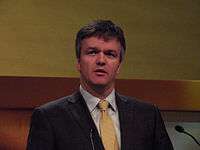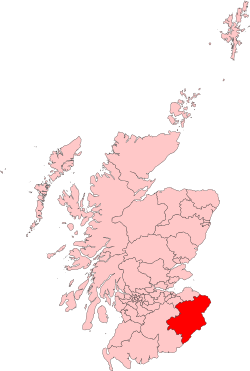Berwickshire, Roxburgh and Selkirk (UK Parliament constituency)
Coordinates: 55°46′34″N 2°24′40″W / 55.776°N 2.411°W
| Berwickshire, Roxburgh and Selkirk | |
|---|---|
|
County constituency for the House of Commons | |
|
Boundary of Berwickshire, Roxburgh and Selkirk in Scotland. | |
| Current constituency | |
| Created | 2005 |
| Member of parliament | Calum Kerr (SNP) |
| Overlaps | |
| European Parliament constituency | Scotland |
Berwickshire, Roxburgh and Selkirk is a constituency of the British House of Commons, located in the south of Scotland within the Scottish Borders council area. It elects one Member of Parliament (MP) at least once every five years using the first-past-the-post system of voting. The incumbent MP is Calum Kerr of the SNP.
A mostly rural seat, it includes the towns of Duns, Eyemouth, Galashiels, Hawick, Jedburgh, Kelso, Melrose and Selkirk.
Boundaries
As created by the Fifth Review of the Boundary Commission for Scotland the constituency is one of six covering the Dumfries and Galloway council area, the Scottish Borders council area and the South Lanarkshire council area. The other five constituencies are: Dumfries and Galloway, Dumfriesshire, Clydesdale and Tweeddale, East Kilbride, Strathaven and Lesmahagow, Lanark and Hamilton East and Rutherglen and Hamilton West.
The Berwickshire, Roxburgh and Selkirk constituency covers part of the Scottish Borders council area. The rest of the council area is covered by the Dumfriesshire, Clydesdale and Tweeddale constituency, which also covers part of the Dumfries and Galloway council area and part of the South Lanarkshire council area.
The Berwickshire, Roxburgh and Selkirk constituency is predominantly rural, and includes the towns of Duns, Eyemouth, Galashiels, Hawick, Jedburgh and Selkirk.
History
Michael Moore held the seat from its creation in 2005, and was MP for the predecessor seat of Tweeddale, Ettrick & Lauderdale from 1997-2005. The seat and its predecessor seats had a strong Liberal presence since the 1960s, with former Liberal leader David Steel having represented the seat from 1965 to 1997. Historically, the Conservative Party has been the main challenger to the seat, and they currently hold the equivalent Holyrood seat. In the 2015 General Election, Moore and the Liberal Democrats were pushed into third place in the constituency and the seat was narrowly won by Calum Kerr of the Scottish National Party over the Scottish Conservative Party candidate, John Lamont.
Members of Parliament
| Election | Member[1] | Party | |
|---|---|---|---|
| 2005 | Michael Moore | Liberal Democrat | |
| 2010 | |||
| 2015 | Calum Kerr | SNP | |
Elections
Elections in the 2010s
Berwickshire, Roxburgh and Selkirk was the eighth most marginal result at the 2015 UK general election and the most marginal result in Scotland, with SNP candidate Calum Kerr gaining the constituency from the Liberal Democrats behind the Conservatives by 328 votes.[2]
| Party | Candidate | Votes | % | ± | |
|---|---|---|---|---|---|
| SNP | Calum Kerr[5] | 20,145 | 36.6 | +27.4 | |
| Conservative | John Lamont[6] | 19,817 | 36.0 | +2.2 | |
| Liberal Democrats | Michael Moore[6] | 10,294 | 18.7 | −26.7 | |
| Labour | Kenryck Lloyd Jones[7] | 2,700 | 4.9 | −5.3 | |
| UKIP | Peter Neilson[7] | 1,316 | 2.4 | +1.2 | |
| Scottish Green | Pauline Stewart[8] | 631 | 1.1 | N/A | |
| Independent | Jesse Rae[7] | 135 | 0.2 | N/A | |
| Majority | 328 | 0.6 | n/a | ||
| Turnout | 55,038 | 74.2 | +7.8 | ||
| SNP gain from Liberal Democrat | Swing | +27.1 | |||

| Party | Candidate | Votes | % | ± | |
|---|---|---|---|---|---|
| Liberal Democrats | Michael Moore | 22,230 | 45.4 | +3.5 | |
| Conservative | John Lamont | 16,555 | 33.8 | +4.9 | |
| Labour | Ian Miller | 5,003 | 10.2 | −5.7 | |
| SNP | Paul Wheelhouse | 4,497 | 9.2 | +0.6 | |
| UKIP | Sherry Fowler | 595 | 1.2 | −0.1 | |
| Scottish Jacobite | Chris Black | 134 | 0.3 | +0.3 | |
| Majority | 5,675 | 11.6 | |||
| Turnout | 49,014 | 66.4 | +2.3 | ||
| Liberal Democrats hold | Swing | −0.7 | |||
Elections in the 2000s
| Party | Candidate | Votes | % | ± | |
|---|---|---|---|---|---|
| Liberal Democrats | Michael Moore | 18,993 | 41.8 | ||
| Conservative | John Lamont | 13,092 | 28.8 | ||
| Labour | Sam Held | 7,206 | 15.9 | ||
| SNP | Aileen Orr | 3,885 | 8.6 | ||
| Liberal | John Hein | 916 | 2.0 | ||
| Scottish Socialist | Graeme McIver | 695 | 1.5 | ||
| UKIP | Peter Neilson | 601 | 1.3 | ||
| Majority | 5,901 | 13.0 | |||
| Turnout | 45,388 | 63.3 | |||
| Liberal Democrats win (new seat) | |||||
References
- ↑ Leigh Rayment's Historical List of MPs – Constituencies beginning with "B" (part 2)
- ↑ https://ukgeneralelection.com/2015/05/10/the-new-election-battleground/
- ↑ "Election Data 2015". Electoral Calculus. Archived from the original on 17 October 2015. Retrieved 17 October 2015.
- ↑ "Archived copy". Archived from the original on 2016-03-04. Retrieved 2015-08-24. 9Aug15
- ↑ Calum Kerr, Biography on SNP website, retrieved March 2015
- 1 2 "UK ELECTION RESULTS". electionresults.blogspot.co.uk.
- 1 2 3 "Candidates for Berwickshire, Roxburgh and Selkirk in the 2015 UK General Election". yournextmp.com.
- ↑ "SCOTTISH GREENS CONFIRM BIGGEST SLATE OF WESTMINSTER CANDIDATES". scottishgreens.org.uk.
- ↑ "Election Data 2010". Electoral Calculus. Archived from the original on 17 October 2015. Retrieved 17 October 2015.
- ↑ "BBC News - Election 2010 - Constituency - Berwickshire, Roxburgh & Selkirk". bbc.co.uk.
- ↑ "Election Data 2005". Electoral Calculus. Archived from the original on 15 October 2011. Retrieved 18 October 2015.
